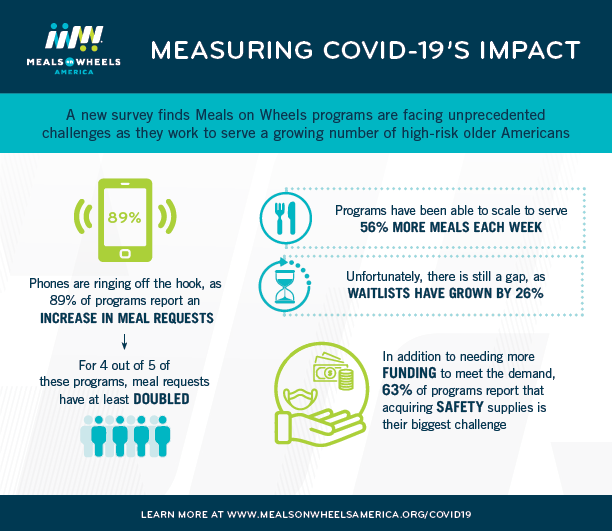COVID-19 has had a major impact on virtually every aspect of life, not least of which is our ability to access the most basic of staples, such as food. The disproportionate threat the virus poses to seniors means that millions more cannot safely make the weekly masked trek to the local grocery store that has become a ritual for many of us.
That is why the need for Meals on Wheels, the service dedicated to providing vulnerable seniors with nutritional support at home, has increased exponentially since the pandemic began.
We recently surveyed our Meals on Wheels Member programs and learned that the impact has truly been cataclysmic.

Ellie Hollander, President and CEO of Meals on Wheels America said, “there is no debate that older Americans have borne the brunt of this pandemic, and if we only examine infection, hospitalization and death rates, we vastly underestimate the true impact. This survey data offers critical insights into the level of support necessary now and beyond the pandemic, to ensure we meet the needs of our most vulnerable populations.”
For Meals on Wheels, shutting down and letting seniors go hungry is simply unfathomable. Rather, programs across the country have discovered creative ways to meet the needs of our clients, while also practicing safe physical distancing and sanitation practices. Here are several examples of the ways we have adjusted our typical operating procedures to meet the increase in demand while following CDC guidelines.
CREATIVE SOLUTIONS THAT RAMP UP FOOD DELIVERY QUICKLY AND SAFELY
Deliveries are taking a “no touch” approach. While the Meals on Wheels model typically includes a friendly, in-person visit, our approach has been modified to accommodate social distancing requirements. Volunteers now leave food at their clients’ doors, give a knock and step back at least six feet to wait for the senior to answer. This gives volunteers the opportunity to connect with clients in person but at a distance, making sure they are alright. Many communities are also deploying telephone check-in programs to frequently touch base with seniors.
Some programs have hired additional personnel to expand their reach. The Meals on Wheels program in Welch, WV, the city with the oldest population in the country, has seen an increase in demand that reaches beyond their traditional service area. They were able to quickly scale up to meet this expanded need by hiring paid drivers to deliver more meals.
Meal delivery frequency is traded off for safety. Many communities have transitioned from daily meal deliveries to weekly or biweekly. By providing a supply of shelf-stable or frozen meals instead of delivering fresh, hot meals, seniors can count on a continual source of food while also minimizing their exposure to others.
Some programs are even delivering necessities beyond meals. A local program in Cincinnati, Ohio is supplying toothpaste, toothbrushes, hand sanitizer and soap to reduce the spread of illness and keep seniors safe. And a team of volunteers in Thousand Oaks, California shops for local seniors, delivering groceries and pantry items to Meals on Wheels clients alongside their meals.
Programs have closed group meal sites and switched to grab-and-go meal pick-up. Meals on Wheels Mesa County of Mesa County, CO, is serving food curbside for pick-up out of a community restaurant two times a week to serve their Palisades, CO, clients. Additional meals are being stored in donated freezer space at a local convention center.
BIGGEST CHALLENGE: UNPRECEDENTED DEMAND FOR SERVICES
Older adults who were mobile prior to the pandemic can no longer safely go to stores to buy their own food. And many do not have loved ones close by to help them through this time. Add this to the roster of seniors who were already homebound, and it’s clear why Meals on Wheels America has established the Meals on Wheels COVID-19 Response Fund.
The good news? People are stepping up to help. “We're seeing in some respects America at its best, wanting to pay it forward and give back," Hollander says.
The Meals on Wheels COVID-19 Response Fund has already distributed more than $7 million to local Meals on Wheels programs in the communities that need it most, thanks to donors and supporters like you. However, there is much, much more to do. To donate to the fund that is saving lives, click here.
Meals on Wheels is making sure seniors aren't forgotten during the crisis with telephone check-ins, community letters and even a friendly wave from the car. Read more here.